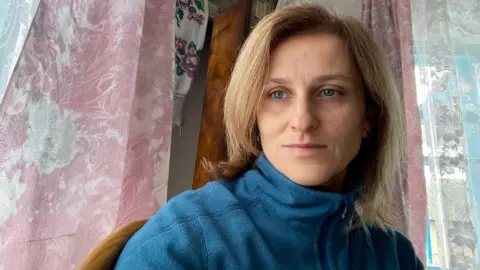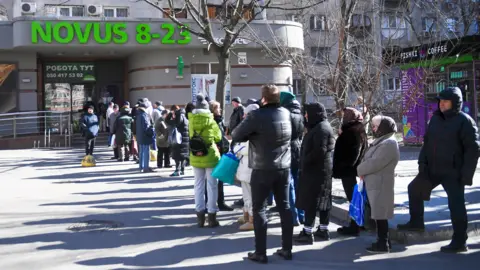BBC Ukrainian editor: 'My mother called to say she'd managed to buy bread'
 BBC
BBCWe are now well into the second week of this war, and I've noticed that I don't cry any more.
I start the day reading the overnight news, counting new blasts all around Ukraine. A couple of days ago, I woke up to reports of major rocket strikes in Kyiv, near where my dad lives. It took me 10 minutes to pluck up the courage to call him, to ask if he and his partner were all right. They were, and I experienced a wave of relief.
When I see horrible pictures of destruction in Kyiv, and Russian tanks in towns and villages just outside, I think of these once-quiet places, where our friends have their dachas, or country cottages. We used to visit them with our kids, we had barbecues, and sipped wine in cosy armchairs. Some of those towns have now been destroyed by heavy fighting and artillery.
At the start of the war, one thing that did bring tears to my eyes was a message on an app for events in Kyiv. It was a list of things that would not happen that day - concerts and exhibitions, events that now seem like something from a previous life. These apps now provide different kinds of information - notifications about air raids, lists of supermarkets with food and pharmacies with medicine.
My mother is more worried about how to get food for her dog and cats than for herself, but she called me the other day just to happily announce that she had managed to buy two loaves of bread! This is in a city where food used to be available in great abundance.
That is more shocking for me than pictures of burned-out Russian tanks. Food shortages and empty shelves are our reality now. People share information on where you can buy and what. Some shops have shortages, but at the same time there is always enough for those who are in need. Restaurants prepare free food for soldiers, people who lost their homes or anyone who needs it.
 Getty Images
Getty ImagesMy 10-year-old son is not going to school, even online. Some teachers have stayed in Kyiv, others have left. His classmates have fled to the countryside or abroad. They chat on Zoom, playing games and pretending to be hackers who fight for Ukraine. One of the chats they have set up on a messaging app is called "war matters".
Every day, Ukrainians face the decision of whether to stay or to leave.
During the first week of war, almost a million packed their bags and left Ukraine to become refugees. That number is rising fast. But many others have decided to stay, at least for now. Famous singers, artists and sportsmen have enrolled in the army. Millions of Ukrainians have become volunteers, trying to help those in greatest need.
It feels like Ukrainians have become one big family where every member is trying to help, in any way they can. Those who can fight, fight. Those who can cook, cook. Those who can deliver, deliver. I heard a heart-breaking story from Kherson, the first city seized by Russian forces, where an elderly man without legs and fingers became a volunteer.
Now every town and village has checkpoints, made of sandbags, cement blocks and cut trees. Armed men - young professionals who fled Kyiv, local farmers or pensioners - check the documents of anyone entering.
The village where I am staying has two checkpoints, manned by local men who take turns to operate them 24 hours a day. They have hunting rifles, and some carry knives or axes. They are ready to protect their small communities with everything they have.
This sense of unity has never been so strong among Ukrainians. The country is full of activity like a beehive, producing hope for victory.

Russia attacks Ukraine: More coverage
- THE BASICS: Why is Putin invading Ukraine?
- TACTICS: Russia meets resistance with more firepower
- OLIGARCHS: The mega-rich men facing global sanctions
- IN DEPTH: Full coverage of the conflict



Are you personally affected by the issues raised in this story? If it is safe to do so email [email protected].
Please include a contact number if you are willing to speak to a BBC journalist. You can also get in touch in the following ways:
- WhatsApp: +44 7756 165803
- Tweet: @BBC_HaveYourSay
- Upload pictures or video
- Please read our terms & conditions and privacy policy
If you are reading this page and can't see the form you will need to visit the mobile version of the BBC website to submit your question or comment or you can email us at [email protected]. Please include your name, age and location with any submission.
